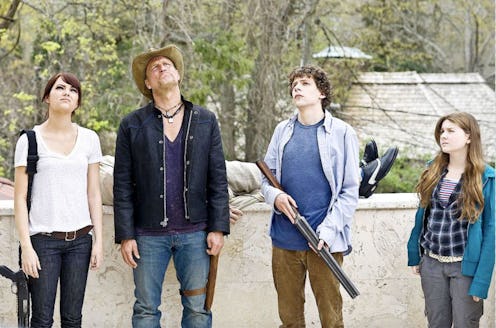Life
An Emergency Alert Went Out To 7,000 Florida Residents About “Extreme Zombie Activity”

Residents of one Florida city received quite the rude awakening in the wee hours of the morning on Sunday, May 20: At around 1:45 in the morning, the city of Lake Worth in Palm Beach County was sent an emergency warning about a power outage — and zombies. According to the Palm Beach Post, the message was unintentional and city officials have since apologized for the confusion; as far as anyone currently knows, the dead have not actually begun to rise and/or take over the world.
Phew.
Here’s what happened:
According to screenshots of the message obtained by a number of news outlets, the warning went out at 1:41 a.m., with a projected repair time of 4:41 a.m. — meaning that the estimated amount of time it would take to restore power would be around three hours. But the loss of power wasn’t the only thing reported by the warning; it also cautioned residents about “extreme zombie activity.” “Power outage and zombie alert for residence of Lake Worth and Terminus,” read the warning. “There are now far less than seven thousand three hundred and eighty customers involved due to extreme zombie activity. Restoration time uncertain.” So much for a three-hour projected repair time, right?
Given that we live in the age of viral marketing, my first impulse upon hearing about this story was to check what was going on with The Walking Dead. I’ve seen stranger publicity stunts for the franchise in the past (you have not truly lived until you’ve encountered a random crowd of zombies on a subway car) — and besides, the mention of Terminus is a clear reference to the property’s flagship show: The location known as Terminus factored prominently in the fourth and fifth seasons. Alas, though, I found no major news stories connected with either show other than some typical recaps for the latest episode of Fear The Walking Dead (Season 4, Episode 6 just aired), so it’s unlikely that the warning was part of a marketing stunt for a big announcement or whatever. For my money, I’d be willing to bet it was a prank of some sort.
We do know that the emergency message did, in fact, come from the city; officials for the city of Lake Worth confirmed that fact to local ABC affiliate WPBF News. Whenever there’s a power outage, the city’s systems automatically launch a message into the ether letting residents know what’s going on — but this one particular message was apparently altered. The officials told WPBF News that they don’t think an employee, either past or present, is responsible; they think they were likely hacked. Either way, though, the officials also said that they don’t think whoever planted the message gained access to the utility itself.
Residents of Lake Worth took to a public Facebook group for the city, Lake Worth Local, to share screenshots and laugh together at the alert a few hours after it had ended. Ben Kerr, Public Information Officer for the city of Lake Worth, also put in appearance in the Facebook thread to clarify some details about the incident — including the fact that zombies were not, in fact, on the loose. According to Kerr, around 7,880 residents were affected by the outage (which explains where the sentence about “less than seven thousand three hundred and eighty customers [being] involved due to extreme zombie activity” came from), with power being restored in 27 minutes — well below the original three-hour estimation. Kerr also noted, “I want to reiterate that Lake Worth does not have any zombie activity currently and apologize for the system message,” adding that officials were looking into the matter.
As funny as the whole thing is, though, it’s actually not completely unexpected that zombies might make their way into a public safety warning (even though zombies don’t actually exist — or at least, not in the George Romero/Danny Boyle/Robert Kirkman sense). “Zombie preparedness” is, after all, just basic disaster preparedness; indeed, the Centers for Disease Control and Prevention (CDC) famously utilized zombie preparedness in 2011 as a means of getting disaster preparedness strategies and tools out into the general public’s hands.
According to Dave Daigle, then the Associate Director for Communications for the CDC’s Public Health and Preparedness department, the idea came to him as the agency was getting ready for hurricane season. “We were talking about hurricane season, which begins 1 June,” he told The Atlantic after the campaign went viral. “I think about hurricane season, and we put out the same messages every year, and I wonder if people even see those messages.” So, he came up with the zombie preparedness initiative in order to get the message out in front of more people.
As Daigle put it, “preparedness and public health are not the sexiest topics” — but the tactic worked in a big, big way: “We posted it on Monday,” he told The Atlantic. “By Wednesday, the server crashed.” Over a 10-day period, the zombie preparedness warning saw roughly three times the amount of traffic the CDC’s warnings usually get.
So, hey: The next time someone laughs at you when you say you’re all ready for the zombie apocalypse, know that the joke is on them. You’ll be prepared to deal with anything — from reanimated corpses to earthquakes.